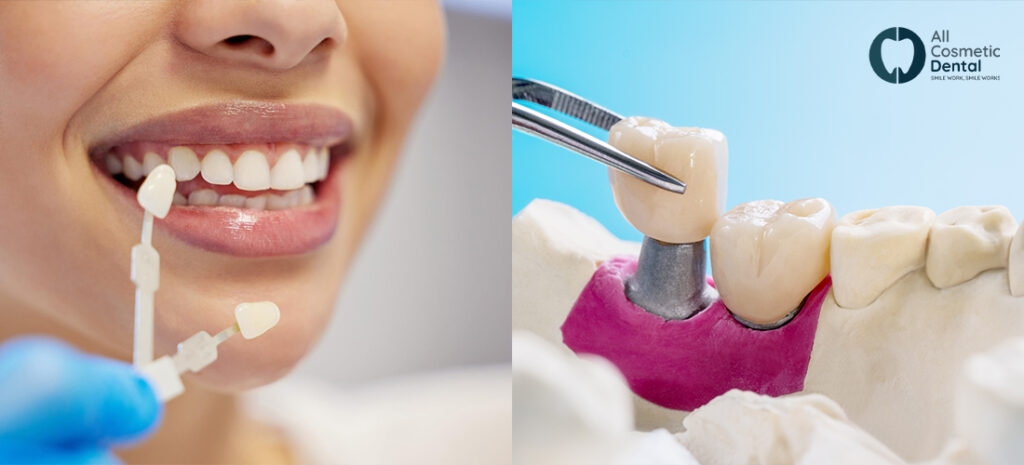Differences Between Veneers and Crowns
Veneers are designed to cover only the front surface of a tooth, whereas crowns provide full coverage, including the biting surface.
While veneers must be bonded to an existing natural tooth, crowns can be placed on both natural teeth and dental implants, acting as a complete tooth replacement.
Your smile is often the first thing people notice about you, and maintaining it can boost confidence and oral health. Veneers and crowns are two popular dental solutions crafted to enhance teeth’ look and performance. However, they serve distinct purposes and require different procedures. Knowing how they differ is essential for selecting the best choice to meet your dental needs.
What Are Veneers and Crowns?
Veneers are thin, tailor-made shells made from porcelain or composite resin that adhere to the front surface of teeth. They are mainly used for aesthetic purposes, helping to correct concerns like discolouration, minor chips, and uneven spacing.
On the other hand, a Dental crowns are caps covering the entire tooth, providing protection and strength. They are typically crafted from porcelain, ceramic, metal, or a combination of materials and are used to restore severely damaged, decayed, or weakened teeth.
Purpose and Uses
Veneers:
- Designed to enhance the appearance of teeth.
- Commonly used for:
- Fixing stained teeth that whitening treatments cannot address.
- Correcting minor alignment or spacing issues.
- Covering small chips or cracks.
- Frequently selected for front teeth because of their natural appearance and visual appeal.
Crowns:
- Serve both restorative and cosmetic functions.
- Commonly used for:
- Strengthening teeth weakened by large fillings or decay.
- Protecting teeth after a root canal procedure.
- Restoring broken, cracked, or worn teeth.
- Suitable for both front and back teeth, as they can handle significant chewing forces.
Procedure Differences
Veneers:
Applying veneers involves minimal enamel removal, typically around 0.5mm. This step ensures the veneers sit flush with the surrounding teeth. Once the teeth are prepared, the dentist creates a mould to design personalised veneers. During the final visit, the veneers are securely attached to your teeth with a durable adhesive and carefully polished to achieve a natural appearance.
Crowns:
Crowns require a more invasive process. The dentist removes a larger portion of the tooth material to make room for the crown. After preparing the tooth, a mold is made, and a temporary crown is fitted to safeguard it. The permanent crown is then custom made in a lab and cemented during a follow-up visit.
Both procedures are tailored to provide a snug fit and long-lasting results, but crowns demand more extensive reshaping due to their comprehensive coverage.
Differences: Veneers vs. Crowns
| Aspect | Veneers | Crowns |
| Coverage | Front surface only | Entire tooth |
| Material | Porcelain or composite resin | Porcelain, ceramic, metal, or hybrid materials |
| Purpose | Cosmetic improvements | Restorative and cosmetic |
| Durability | 10–15 years with proper care | 15–20+ years with proper care |
| Tooth Removal | Minimal enamel removal | Significant reshaping |
Pros and Cons of Veneers
Pros:
- Provide a highly natural and aesthetic look.
- Require minimal removal of tooth structure.
- Resistant to staining, especially porcelain veneers.
Cons:
- Not suitable for heavily damaged or decayed teeth.
- May break or fracture when subjected to significant pressure.
- Irreversible due to enamel removal.
Pros and Cons of Crowns
Pros:
- Durable and capable of withstanding significant pressure.
- Restore both function and appearance of damaged teeth.
- Versatile for both restorative and cosmetic purposes.
Cons:
- Requires extensive reshaping of the tooth.
- More invasive than veneers.
- May cause temporary sensitivity after placement.
Choosing the Right Option
When deciding between veneers and crowns, it’s essential to consider:
- Condition of Your Teeth: Veneers work best for cosmetic improvements, while crowns are more suitable for teeth requiring structural support.
- Longevity: Crowns generally last longer, making them a better investment for severely damaged teeth.
- Aesthetic Goals: Veneers are ideal for enhancing the appearance of front teeth due to their natural finish.
- Budget: Crowns may be more expensive due to their restorative function and durability.
Discuss your specific dental needs with a professional to identify which choice will deliver the most effective outcome.
Maintenance Tips for Veneers and Crowns
- Clean your teeth and floss regularly to support healthy gums and reduce the risk of decay.
- Steer clear of biting hard items, such as ice or pens, to protect against damage.
- Use a non-abrasive toothpaste to protect the restoration’s surface.
- Plan routine dental visits to keep track of the condition of your veneers or crowns.
- Think about using a mouthguard if you clench or grind your teeth while sleeping.
With proper care, both veneers and crowns can provide long-lasting, functional, and aesthetic benefits.
Conclusion
Both veneers and crowns are effective dental solutions created to improve your smile and safeguard your teeth. While veneers excel in cosmetic improvements, crowns offer comprehensive restoration for severely damaged teeth. Selecting the best option relies on your unique dental needs, objectives, and financial considerations. Consult a qualified dentist to discuss your needs and ensure a solution that gives you confidence in your smile for years to come.
Looking to improve your smile or restore damaged teeth? Whether veneers or crowns are right for you, our experienced dental team at All Cosmetic Dental can help you make the best choice. Contact us today to explore your options and get personalised care tailored to your needs. Let us help you achieve a smile you can feel proud of!

